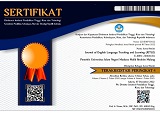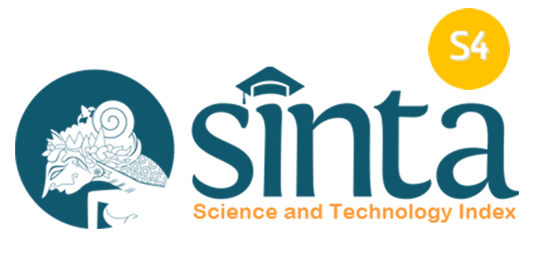The effects of online learning on English language education during the COVID-19 pandemic: A meta-analysis
Abstract
This study aims to conclude the effects of online learning on English language education during the coronavirus disease (COVID-19) pandemic. This meta-analysis study examined the results of relevant studies conducted and published in various
countries worldwide within the two years of the pandemic (between January 2020 to April 2022). With a database of 430 research, only eight articles met the inclusion requirements to answer the overview of the effects and four articles to answer the overall effect, benefits, and drawbacks of online learning on English language education. The data were analysed quantitatively and qualitatively. Data in percentages and figures representing the effects of online learning were analysed using quantitative methods. The important research findings, including the advantages and disadvantages of online learning based on content analysis, were described using qualitative data analysis. The objectives of researching online learning in English language education, forms of online learning research, samples, analyses of online learning research data, and settings of online learning research were discovered from the eight research publications this meta-analysis found. The outcomes demonstrated that online learning positively impacted English language instruction during the COVID-19 pandemic.
Keywords
Full Text:
PDFReferences
Adarkwah, M. A. (2021). "I'm not against online teaching, but what about us?": ICT in Ghana post Covid-19. Education and Information Technologies, 26(2), 1665–1685. https://doi.org/10.1007/s10639-020-10331-z
Arnold, J. (2009). Affect in L2 Learning and Teaching. Estudios de Lingüística Inglesa Aplicada, 9, 145–151.
Ayu, M., & Pratiwi, Z. F. (2021). The Implementation of Online Learning in English Language Teaching During Pandemic: the Teachers'Voice. Journal of Research on Language Education, 2(2), 93–99.
Crawford, J., Henderson, K. B., Rudolph, J., Malkawi, B., Glowatz, M., Burton, R., Magni, P. A., & Lam, S. (2020). Journal of Applied Learning & Teaching COVID-19 : 20 countries' higher education intra-period digital pedagogy responses. Journal of Applied Learning & Teaching, 3(1), 1–20.
Derakhshan, A. (2021). Emergence Distance Education (EDE) Role in the Learning of English Language Skills during COVID-19 Pandemic. Journal of Teaching Language Skills, 40(3), 41–82. https://doi.org/10.22099/jtls.2021.39849.2948
Erarslan, A. (2021). English language teaching and learning during Covid-19: A global perspective on the first year. Journal of Educational Technology and Online Learning, 4(2), 349–367. https://doi.org/10.31681/jetol.907757
Fuchs, K. (2022). The difference between Emergency Remote Teaching and e-learning. Frontiers in Education, 7. https://doi.org/10.3389/feduc.2022.921332
Glass, G. V. (1976). Primary, Secondary, and Meta-Analysis of Research. Educational Researcher, 5(10), 3–8. https://doi.org/10.3102/0013189x005010003
Hampel, R., & Stickler, U. (2012). The use of videoconferencing to support multimodal interaction in an online language classroom. ReCALL, 24(2), 116–137. https://doi.org/10.1017/S095834401200002X
Hou, J., Lee, J. F., & Doherty, S. (2022). A study of the effects of mobile media on L2 text processing: Beyond offline comprehension accuracy measures. Computers and Education, 182.
Husaini, R. (2020). Student’s response in online learning process: A case study of English Education Students. Journal of English Language Teaching and Learning (JETLE), 2(1), 16-22. http://dx.doi.org/10.18860/jetle.v2i1.10127
Hussein, E., Daoud, S., Alrabaiah, H., & Badawi, R. (2020). Exploring undergraduate students' attitudes towards emergency online learning during COVID-19: A case from the UAE. Children and Youth Services Review, 119(August). https://doi.org/10.1016/j.childyouth.2020.105699
Jebbour, M. (2022). The unexpected transition to distance learning at Moroccan universities amid COVID-19: A qualitative study on faculty experience. Social Sciences & Humanities Open, 5(1), 100253. https://doi.org/10.1016/j.ssaho.2022.100253
Karataş, T. Ö., & Tuncer, H. (2020). Sustaining language skills development of pre-service EFL teachers despite the COVID-19 interruption: A case of emergency distance education. Sustainability, 12(19). https://doi.org/10.3390/su12198188
Khamkaew, S. (2021). The Effects of Online Learning during the Outbreak of Coronavirus Disease 2019 (COVID-19) towards Grade 10-12 Thai Students' Opinions. Journal of World Englishes and Educational Practices (JWEEP), 3(1), 53–62. https://doi.org/10.32996/jweep
Lee, A. R., & Bailey, D. R. (2020). Learning from experience in the midst of covid-19: Benefits, challenges, and strategies in online teaching. Call-Ej, 21(2), 176–196.
Lie, A., Tama, S. M., Gozali, I., Triwidayati, K. R., Utami, T. S. D., & Jemadi, F. (2020). Secondary School Language Teacher's Online Learning Engagement During the Covid-19 Pandemic in Indonesia. Journal of Information Technology Education: Research, 19, 803–832.
Mallett, R., Hagen-Zanker, J., Slater, R., & Duvendack, M. (2012). The benefits and challenges of using systematic reviews in international development research. Journal of Development Effectiveness, 4(3), 445–455. https://doi.org/10.1080/19439342.2012.711342
Mardiah, H. (2020). The Use of E-Learning to Teach English in the Time of the Covid-19 Pandemic. English Teaching and Linguistics Journal (ETLiJ), 1(2), 45–55. https://doi.org/10.30596/ETLIJ.V1I2.4894
Means, B., Toyama, Y., Murphy, R., & Baki, M. (2013). The effectiveness of online and blended learning: A meta-analysis of the empirical literature. Teachers College Record, 115(3).
Meinck, S., Fraillon, J., & Strietholt, R. (2022). The impact of the
COVID-19 pandemic on education International evidence from the Responses to Educational Disruption Survey (REDS). https://eric.ed.gov/?id=ed618542
Mohtar, M., & Md Yunus, M. (2022). A systematic review of online learning during COVID 19: Students’ motivation, task engagement and acceptance. Arab World English Journal (AWEJ) 2nd Special Issue on Covid 19 Challenges, (2), 202-215. https://dx.doi.org/10.24093/awej/covid2.13
Nassaji, H. (2021). Effect sizes in quantitative and qualitative research. Language Teaching Research, 25(5), 681–684. https://doi.org/10.1177/13621688211040882
Putra, R. W. P. (2021). Improving the Students' Motivation in Learning English through Google Meet during the Online Learning. English Learning Innovation, 2(1), 35–42. https://doi.org/10.22219/ENGLIE.V2I1.14605
Qiyun, W., & Huay, L. W. (2007). Comparing asynchronous online discussions and face-to-face discussions in a classroom setting. British Journal of Educational Technology, 38(2), 272–286. https://doi.org/10.1111/j.1467-8535.2006.00621.x
Richards, J. C. (2022). Exploring Emotions in Language Teaching. RELC Journal, 53(1), 225–239. https://doi.org/10.1177/0033688220927531
Famularsih, S. (2020). Students' Experiences in Using Online Learning Applications Due to COVID-19 in English Classroom. Studies in Learning and Teaching, 1(2), 112–121. https://doi.org/10.46627/silet.v1i2.40
Rohmana, W. I. M., Kamal, S., Amani, N., & As-Samawi, T. A. (2023). Academic dishonesty in online English as a Foreign Language classroom. EnJourMe (English Journal of Merdeka) : Culture, Language, and Teaching of English, 7(2), 230–240. https://doi.org/10.26905/enjourme.v7i2.8827
Talal, A. (2021). Online learning during the COVID-19 pandemic from the perspectives of English as foreign language students. Educational Research and Reviews, 16(7), 279–288. https://doi.org/10.5897/err2021.4169
Tang, Y. M., Chen, P. C., Law, K. M. Y., Wu, C. H., Lau, Y. yip, Guan, J., He, D., & Ho, G. T. S. (2021). Comparative analysis of Student’s live online learning readiness during the coronavirus (COVID-19) pandemic in the higher education sector. Computers and Education, 168(November 2020). https://doi.org/10.1016/j.compedu.2021.104211
Thi, D., & Luy, T. (2022). Remote Teaching amid the Covid-19 Pandemic in Vietnam: Primary School EFL Teachers' Practices and Perceptions. AsiaCALL Online Journal, 13(1), 1–21. http://eoi.citefactor.org/10.11251/acoj.13.01.001
Tuncer, H., & Karataş, T. Ö. (2022). Recommendations of ELT Students for Four Language Skills Development: A Study on Emergency Distance Education During the COVID-19 Pandemic. SAGE Open, 12(1). https://doi.org/10.1177/21582440221079888
United Nations Educational, Scientific and Cultural Organization. (2020). Education: from school closure to recovery, 395-410. https://en.unesco.org/covid19/educationresponse
United Nations Educational, Scientific and Cultural Organization. (2021, March 24). One year into COVID: Prioritising education recovery to avoid a generational catastrophe. https://en.unesco.org/news/one-year-covid-prioritizing-education-recovery-avoid-generational-catastrophe
Wong, K. M., & Moorhouse, B. L. (2021). Digital competence and online language teaching: Hong Kong language teacher practices in primary and secondary classrooms. System, 103(September), 102653. https://doi.org/10.1016/j.system.2021.102653
Yan, C., & Wang, L. (2022). Experienced EFL teachers switching to online teaching: A case study from China. System, 105. https://doi.org/10.1016/J.SYSTEM.2021.102717
Yılmaz İnce, E., Kabul, A., & Diler, İ. (2020). Distance Education in Higher Education in the COVID-19 Pandemic Process: A Case of Isparta Applied Sciences University. International Journal of Technology in Education and Science, 4(4), 343–351. https://doi.org/10.46328/ijtes.v4i4.112
Yuan, Y. & Hunt R.H. (2009). Systematic reviews: the good, the bad, and the ugly. Am J Gastroenterol, 104(5),1086–1092. http://dx.doi.org/10.1038/ajg.2009.118
DOI: https://doi.org/10.18860/jetle.v4i2.20617
Refbacks
- There are currently no refbacks.
Jalan Gajayana 50 Malang 65144, Jawa Timur, Indonesia

This work is licensed under a Creative Commons Attribution-ShareAlike 4.0 International License.
Indexed by






